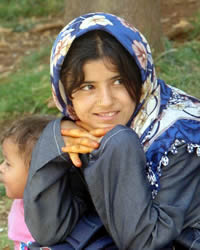Zaza, Southern in Türkiye (Turkey)

Photo Source:
CharlesFred - Flickr
Creative Commons
|
Send Joshua Project a map of this people group.
|
| People Name: | Zaza, Southern |
| Country: | Türkiye (Turkey) |
| 10/40 Window: | Yes |
| Population: | 1,344,000 |
| World Population: | 1,344,000 |
| Primary Language: | Zazaki, Southern |
| Primary Religion: | Islam |
| Christian Adherents: | 0.00 % |
| Evangelicals: | 0.00 % |
| Scripture: | Portions |
| Ministry Resources: | Yes |
| Jesus Film: | No |
| Audio Recordings: | No |
| People Cluster: | Kurd |
| Affinity Bloc: | Persian-Median |
| Progress Level: |
|
Introduction / History
Most Zaza people consider themselves Kurdish; they have much in common with the Zaza Kurds. However, the difference is that the Zaza language is like the north-Caspian (Armenian) spoken language and belongs to the Indo-European language family.
What Are Their Lives Like?
Zaza society is traditionally patriarchal, and their traditions and history are passed on orally. The Zaza people remain largely illiterate. They live in valleys and mountains as nomadic people, shepherding their livestock and relying on agricultural products.
What Are Their Beliefs?
The primary religion of the Zazas is Sunni Islam, but the Southern Zaza people identify themselves in the Dimli subgroup, referring to a dialect of the Zaza language.
What Are Their Needs?
Secularism makes Zaza people change their religious structure nowadays. Their spiritual leaders no longer have power in Zaza society and the community cannot provide the individual needs. Zaza have a lot of hidden marriage problems and dysfunctional family relations. This often causes the Zaza people to cry out to God for help. God does not want this small ethnic group to miss his mission. They need to hear the message of the only redeemer even though they cannot read the Bible and depend on learning the stories.
Prayer Points
Pray for gospel workers to catch a vision for reaching the Zaza people for Jesus and that in God's sovereign timing their hearts would be open and ready to follow Him.
Pray for Jesus movements to bless extended families so the gospel will spread rapidly among this people group.
Pray for the spiritual lives of the Zaza people to become fruitful as they follow Christ.
Pray for the lives and culture of the Zaza people to evidence the rule and reign of the Kingdom of God as they open to the gospel, and for the beauty of Jesus to be seen in them.